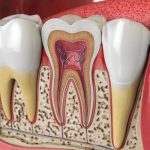Root canal treatment, often referred to simply as a “root canal,” is a dental procedure aimed at treating infection or damage deep within a tooth’s pulp chamber. Despite its notorious reputation for being associated with discomfort, root canal treatment is a common and highly effective procedure performed by dentists across the United Kingdom. This article delves into the intricacies of root canal treatment in the UK, covering its procedure, benefits, and essential aftercare practices.
Understanding Root Canal Treatment:
Root canal treatment becomes necessary when the pulp, the soft tissue inside the tooth that contains nerves, blood vessels, and connective tissue, becomes infected or inflamed. This can occur due to various reasons, including deep decay, repeated dental procedures on the tooth, or trauma. If left untreated, the infection can spread, leading to severe pain, abscess formation, and even tooth loss.
During a root canal procedure, the dentist removes the infected or damaged pulp from the tooth, cleanses the inside of the tooth, and then seals it to prevent further infection. While the procedure may sound daunting, advancements in dental technology and techniques have made it relatively comfortable and efficient, with most patients experiencing little to no discomfort.
Procedure:
Initial Examination: The dentist begins by examining the tooth and taking X-rays to assess the extent of the damage and plan the treatment.
Anesthesia: Local anesthesia is administered to numb the tooth and surrounding area, ensuring the patient’s comfort throughout the procedure.
Accessing the Pulp: The dentist creates an opening in the tooth’s crown to access the infected pulp chamber and root canals.
Cleaning and Shaping: Specialized instruments are used to remove the infected pulp, clean the canals, and shape them to prepare for filling.
Filling: Once the canals are cleaned and shaped, they are filled with a biocompatible material called gutta-percha to seal them and prevent recontamination.
Restoration: In many cases, a dental crown is placed over the treated tooth to restore its strength, function, and appearance.
Benefits of Root Canal Treatment:
Preservation of Natural Tooth: Root canal treatment allows patients to retain their natural tooth, which is essential for maintaining proper chewing function and preventing adjacent teeth from shifting.
Pain Relief: By removing the infected pulp and eliminating the source of pain, root canal treatment provides significant relief from toothaches and discomfort.
Prevention of Further Complications: Treating the infection promptly with root canal therapy prevents it from spreading to surrounding tissues and causing more serious oral health issues.
Cost-Effective: In the long run, root canal treatment is often more cost-effective than tooth extraction followed by tooth replacement options like dental implants or bridges.
Aftercare Practices:
After undergoing root canal treatment, patients are advised to follow these essential aftercare practices to ensure proper healing and maintain oral health:
Practice Good Oral Hygiene: Brush and floss regularly to keep the treated tooth and surrounding teeth clean and free from plaque buildup.
Avoid Chewing on Hard Foods: Refrain from biting down on hard or crunchy foods immediately after the procedure to prevent damaging the restored tooth.
Attend Follow-Up Appointments: Attend scheduled follow-up appointments with your dentist to monitor the healing process and address any concerns promptly.
Maintain Regular Dental Check-Ups: Continue to visit your dentist for regular check-ups and cleanings to prevent future dental issues and ensure the long-term success of the root canal treatment.
Conclusion
In conclusion, root canal treatment is a vital dental procedure that helps alleviate pain, preserve natural teeth, and restore oral health for patients across the United Kingdom. By understanding the procedure, benefits, and aftercare practices associated with root canal treatment, patients can approach it with confidence and achieve optimal outcomes in terms of both oral health and overall well-being. If you’re experiencing tooth pain or suspect you may need root canal therapy, don’t hesitate to consult with your dentist to explore your treatment options.











